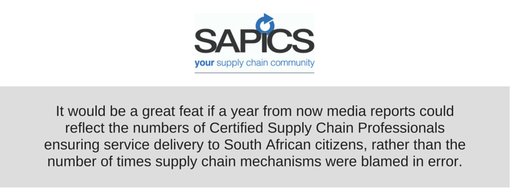|
The supply chain management community of South Africa wants to highlight another critical error made in shifting the blame of the Nkandla scandal to supply chain mechanisms: the correct terminology to use would have been public procurement mechanisms.
The term supply chain describes far more than just procurement. This very specialised profession encompasses all activities needed to deliver the right product or service to the right customer, at the right time, place, and cost. Supply chain management theory delves deep into the efficiencies of sourcing, processing, manufacturing, transporting, storing, distributing, tracking, and returning anything from raw metals to household products sold in retail stores. References to supply chain problems in the public sector as catchall term for public procurement policies that lead to fruitless and wasteful expenditure are not only inaccurate, but dangerous, as it shifts the focus away from the true problem at hand. It is also an insult to highly qualified professionals that ensure on a daily basis that South African consumers have easy access to a wide variety of local and imported products and services that make their lives possible and enjoyable. Managing a supply chain demands an understanding of an entire value chain; all the suppliers that work seamlessly together to ensure that doctors have the necessary machinery to perform life-saving operations, that enjoying fresh seafood is possible even thousands of kilometers away from the sea, and that your online shopping order arrives at a time and place convenient for you. The Western Cape province is an example of public sector organisations that have a solid grasp of the true meaning of supply chain. The proof is evident in an increase in clean audits, exceptional delivery of basic services to its citizens, and a number of other statistics that show that local government can serve with excellence its constituents within the framework of the Public Financial Management Act (PFMA) that set out public procurement – referred to as supply chain – processes. While it can be argued that the matter at hand is one of semantics, something as small as a change in understanding that there is more to supply chain – and content citizens as a results – than just procuring goods and services within a legislative framework. The next step would be to ensure that all civil servant employed in a supply chain capacity are well trained in the theory of comprehensive supply chain management. It would be a great feat if a year from now media reports could reflect the numbers of Certified Supply Chain Professionals ensuring service delivery to South African citizens, rather than the number of times supply chain mechanisms were blamed in error. ENDS Issued by: SAPICS - your supply chain community MEDIA CONTACT: Juanita Vorster, juanita@thatpoint.co.za, www.atthatpoint.co.za For more information on SAPICS please visit: Website: www.sapics.org.za Twitter: @SAPICS01 LinkedIn: SAPICS group Facebook: OperationsManagement
0 Comments
 Blame for the growing water crises in South Africa has been shifted from corruption at municipal level, to lack of maintenance planning at water treatment facilities, to copper theft and electricity infrastructure failures, and most recently, to the unexpected hot weather. According to supply chain experts, the long term solution to the on-going service delivery problems of South Africa should begin by changing the public sector understanding of basic supply chain management principles. “In acting on their mandate to deliver basic services to citizens, state officials tend to focus on the procurement of goods and services rather narrowly, whereas they should be looking at the supply chain as a whole, from the sources of raw materials to the end-user,” says Colin Seftel, a former director of SAPICS, the industry body for supply chain professionals in South Africa. Procurement vs Supply Chain Management Seftel explains that procurement refers to the specific function of purchasing goods and services from a direct supplier, and takes little account of the upstream suppliers and processes that go into the production of goods, maintenance of infrastructure and delivery of services. By contrast, supply chain management looks at the whole chain, which usually begins with the production of raw materials and ends with delivery to consumers. Supply chain management attempts to balance supply with demand, and so its starting point is the consumer demand. In balancing supply and demand, it includes disciplines such as demand planning, quality management, capacity planning, maintenance planning, as well as increasing and upgrading infrastructure and resources in line with future growth. Public vs Private Sector The supply chain management way of thinking is better understood in the private sector, where companies have to compete for business. Oversupply represents a potential loss to a company, whereas undersupply results in unhappy customers who are likely to take their business elsewhere. In industries with advanced supply chains, such as the automotive industry, companies understand that they exist—and are competitive—only insofar as the supply chain of which they form part is operating optimally. Thus all the companies within a particular supply chain collaborate as closely as possible. This means sharing the vital information flowing from the customer, and then optimising all activities along the supply chain in the light of that information. “Government’s supply chain has somewhat different dynamics, but the principles are not dissimilar,” Seftel maintains. “The current problem however stems from the strong focus on procurement in government supply chains, instead of a focus on delivery.” “What if government were to consider the supply chain in its entirety, and how to get it functioning optimally—and geared to supply what the customers or citizens want? That way you would start to get the various components of the supply chain working together to satisfy the citizen, rather than each one simply trying to optimise its own profit, and government could start to see its spend being more directly linked to benefits its citizens.” “In other words, you wouldn’t be looking for the lowest tender for supplying replacement parts to a water treatment facility, but the most efficient way to supply clean running water to a thirsty community,” Seftel concludes. PHOTO CAPTION: Colin Seftel, former director of SAPICS ENDS MEDIA CONTACT: Juanita Vorster, 079 523 8374, [email protected] For more information on SAPICS please visit: Website: www.sapics.org.za Twitter: @SAPICS01 LinkedIn: SAPICS group Facebook: OperationsManagement |
Welcome to the SAPICS Newsroom. For media releases prior to August 2014, please click here.
Archives
January 2017
Categories
All
|


 RSS Feed
RSS Feed